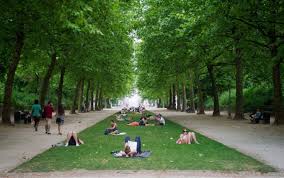One day in my Parks and Recreation class, a guest speaker came in to speak about how outdoor recreation is necessary for one’s social health and well being. Throughout the lecture he explained how outdoor recreation is becoming more popular throughout the United States, which could be because people recognize the benefits of outdoor recreation and nature. So, does nature affect one’s health?
After doing some research I found quite a bit of information on the benefits of being in nature. First of all, nature soothes. Robert Ulrich conducted a study on patients who had gallbladder surgery. Half of the patients had a view of trees, while the other half had a view of the wall. The patients with a view of the tree were able to handle the pain better, had less negative effects, and left the hospital sooner than those who were provided a view of the wall. Follow up studies similar to the one above were conducted as well, and concluded that natural scenes were more conducive for health/recovery than looking at urban scenery.
“Urban nature”, such as parks and walkways and incorporated into building designs elicits a calming/inspiring environment which encourages learning, and alertness.
Also according to this article, nature is said to:
- Reduce stress
- Heal
- Restore
- Connect
Nature has been found to restore. One study in Mind results showed that 95% of those interviewed said their mood improved after spending time outside, changing from depressed, stressed, and anxious to more calm and balanced. The study may not be that reputable though, since the respondents may of had the desire to please the researcher.
In a study cited in a book titled Healing Gardens, researchers found that two-thirds of people chose a natural setting to go to when stressed. Research has shown that environments can either increase or reduce our stress. Unpleasant/noisy environments can cause anxiety, sadness, or a feeling of helplessness which triggers the fight or flight response (elevated blood pressure/heart rate, and muscle tension which suppresses one’s immune system. On the other hand, pleasing locations reverse that, which are usually filled with nature (humans naturally find nature to be pleasing regardless of age/culture).
“Nature Deprivation” which is a lack of time in the natural world due to spending an overwhelming amount of time watching television or being on the computer has been associated with depression, and also correlates with a higher risk of death according to a study published by the Journal of the American College of Cardiology in 2011.
In another study titled The Benefits of Nature Experience: Improved affect and cognition done by Gregory Bratman found that nature decreases anxiety and rumination, along with producing benefits for cognition such as complex working memory span task.
Two major theories have been proposed to explain nature’s restorative benefits:
- Affective- this theory poses that natural environments such as meadows, lakes, and forests have a restorative advantage over artificial environments since humans have an intrinsic connection with nature due to the role it played in our evolution as species. Also, “nature scenes activate our parasympathetic nervous system in ways that reduce stress and autonomic arousal.”
- Cognitive- this theory exclaims that natural environments invoke a sense of “fascination,” “being away,” “extent,” and “compatibility” that can result in the replenishment of directed attention because they are less heavily taxed in these alternative environments. Consequently, this may lead to improved performance on test that measure the memory and attention.
Over the past few decades outdoor recreation has been growing rapidly, a huge reason for this is because people are finally beginning to realize the importance of ecology to one’s health. Many researchers believe that without ecological health, human health cannot exist.
Bottom Line: There has been many studies conducted to support the hypothesis that nature has a positive affect on human health. On the other hand, I had difficulty finding detrimental affects of nature.
Although there are many studies in favor that nature affects one health, this theory may suffer from the file drawer problem where as negative results would conclude that nature has no affect on humans. Although that seems highly unlikely.
https://books.google.com/books?id=ffnSgk3f1cYC&pg=PA213&lpg=PA213&dq=robert+ulrich+gall+bladder+surgery&source=bl&ots=qEHTFy2ZPV&sig=JkH1uNWhpaKPpVOtdbwJfGIg_hg&hl=en&sa=X&ved=0CCUQ6AEwAWoVChMI7_HH4tSWyQIViEMmCh2-2ASQ#v=onepage&q=robert%20ulrich%20gall%20bladder%20surgery&f=false
http://well.blogs.nytimes.com/2015/07/22/how-nature-changes-the-brain/?_r=0
Click to access health_and_wellness.pdf
http://heapro.oxfordjournals.org/content/21/1/45.short
http://www.takingcharge.csh.umn.edu/enhance-your-wellbeing/environment/nature-and-us/how-does-nature-impact-our-wellbeing
https://depts.washington.edu/hhwb/Thm_Mental.html

